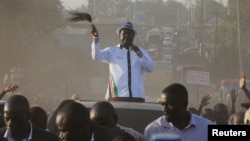Kenya is less than a month from nationwide voting, and the electoral commission remains under pressure.
The commission is appealing a High Court order that would allow the reopening of bidding for printing presidential ballots a week before the general election was set to start, even as the opposition prepares to take the commission to court on another issue.
Meanwhile, the voter registry continues to spark debate and confusion.
When Kenya's Independent Electoral and Boundaries Commission opened a short message platform two weeks ago so the public could check voter details, many like Florence, a businesswoman, used it and found her details were correct, but she noticed those of her sibling were not.
She said her sister checked her details and found her identification number was registered to another person and she was a registered voter in Kiambu, Gatundu East, while she is a registered voter at Buruburu in Nairobi. She went to where she registered as a voter, and they put her name back. She was furious.
Many Kenyans were sent random numbers or incomplete digits, but they were still registered, raising questions about the credibility of the register.
Electoral body commissioner Roselyne Akombe defended her organization.
“What we have seen is that [in the] majority of those cases, people are putting their correct national ID numbers, but that is not probably what we have in the system because the number has been transposed and when they try to put in the information, it does not come out. But it does not mean that they are not in the register,” she said.
The audit firm KPMG, which was hired to clean the register, found 90,000 dead voters on the rolls and another half-million people who used wrong or inconsistent ID numbers. The electoral body said it has removed the names of at least 88,000 dead voters from the list.
Florist Simon Musungu said the voter register must be published.
“The register should be published so that everyone can verify their details," he said. "That will benefit the IEBC, too. They cannot know everything. There is a problem because one vote matters. Even if one person does not vote, you deny him his rights.”
The electoral commission and the opposition have been battling in the courts on matters dealing with cancellation of presidential ballot papers by the high court. The court ruled the IEBC was required to conduct public participation in the award of the tender to Al Ghurair to print 120 million ballots for the August 8 general election, in which nearly 20 million Kenyans are eligible to vote.
The Electoral Commission is appealing that decision.
The opposition is also asking the court to rule on what means of ballot counting and transmitting the results should be used.
In December, the parliament passed a law allowing the IEBC to use manual voting and transmission in case the electronic technology fails.
The head of the Electoral Law and Governance Institute in Africa, Felix Odhiambo, said the failures of the past are haunting the commission.
“IEBC is yet to demonstrate that technology will work," he said. "Remember in 2013, despite the assurances by the Independent Electoral and Boundaries Commission, the technology failed, so as we speak, the election act talks of technology to be put in place 60 days to the election, tested and its workability ascertained, but as we speak, the IEBC has not contested these gadgets, so opinion is still divided whether they will work or not.”
Political observers predict a close contest between the incumbent, Uhuru Kenyatta, and former Prime Minister Raila Odinga. Many hope the August 8 elections will be free, fair and credible to avoid violence similar to that in 2008.




